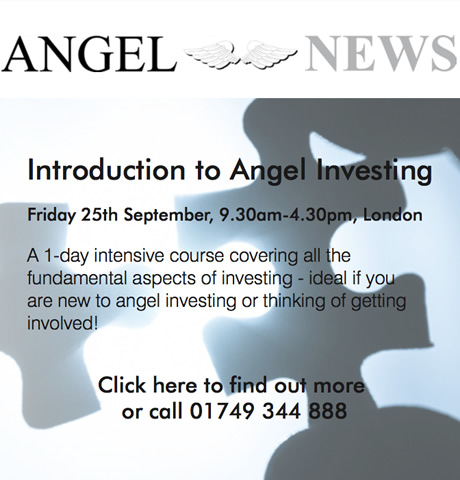What the new EIS and SEIS stats tell us
HMRC has now confirmed that 2,710 companies raised a tad under £1.5bn under EIS in 2013-14 and almost 2,000 companies raised £164m under SEIS. The average investment per company under SEIS was £82,000. Since SEIS was launched in 2012-13, almost 2,900 individual companies have received investment through the scheme and over £250 million in investment has been raised. You can see the full report HERE.
Some key points to have at your finger tips when discussing the schemes
- Over 4,000 companies used the schemes in 2014.
- The average amount invested under EIS per company has grown from £418k to £538k.
- The average amount invested under SEIS per company has grown from £74k to £82k
- Over half of EIS Funding goes to companies raising under the scheme for the first time - this has been true in every year since the Scheme started bar one.
- AngelNews's estimate of the number of active Crowd investors (rather than those registered but passive) is around 25,000 in 2014 and this will have grown significantly in 2015.
- AngelNews's estimate of the number of "angel" or SEIS/EIS investors is now around 30,000.
These charts which we sourced from the HMRC report make for interesting reading.
This shows the remarkable growth in EIS since the Coalition Government was elected. The trajectory is similar to 98-01, but are we heading for another crash in 2015, we think not!
Companies are raising more money per head than in the past. The fact that the growth rate in number of companies raising is nowhere near as high as in 98-01 should give comfort that a crash will not come. Instead investors are clearly placing greater faith in what they see to be the "winners." Of course cynics might suggest that access to funding for many companies is still not as available as some would like.
The fact that more money is raised by companies seeking funding for the first time, might suggest we are still looking to back "start ups" rather than "scale ups" - should we be concerned - probably!
Is is telling that the average investment per company under SEIS is only £82k. If a typical "start up" faces costs of c£10k a month - office costs, a bit of salary and travelling etc - we are still only giving start ups c 8 months runway. Is this really sufficient to create unicorns?
Let us know what you think!
10 things to think about during your summer holidays
While you are playing in the sun and sand over the next four weeks, you might like to muse on the following!
1. The new ECF, VCT, EIS, SEIS and SITR and some regional VC fund rules which will be enacted after the signing of the Finance Act which will, inter alia:
- restrict the total amounts of "State Aid" tax break funding to a lifetime limit of £12m, except for "knowledge intensive companies" where it will be £20m (note these sums may include R&D and other grants if they fall within the definition of State Aid)
- ban the use of such monies to do "buy and build" investments
- restrict investment using such monies to within 7 years of a company making its first commercial sale (10 years if it is a "knowledge intensive company.")
It would be well worth getting a qualified expert on these schemes to take a look at your portfolio and to check where you own investment boundaries will be in the future.
2. The wall of new activity we will see in the crowddfunding market will make the early stage market a very interesting place to be. With Crowdcube's latest round including investment from DFJ and Numis, Seedrs £10m round including money from Neil Woodford's Patient Capital and Syndicate Room's recent £1.2m round, we can expect to see an explosion of investment activity. There are rumours that InvestDen, a new arrival in the market will be splurging on advertising in September and we are seeing the likes of Crowd for Angels, Investing Zone and Venture Founders becoming more and more active.
3. The resources available to angel and crowd investors are growing all the time. Make sure you have it all at your fingertips!
- There will be more Angel Training Courses run by the UKBAA and ourselves (call 01749 344 888 for more details).
- Check out the likes of the Tendr app (a must have for all angels now that Envestors has signed up!) for up to the minute deal flow.
- The arrival of Crowdnetics in the UK and Crowdsurfer will provide excellent data on crowdfunding.
- Check out Intelligent Crowd TV – maybe there will be a deal for you in its new weekly “The Seed and EIS Hour”.
- If you want to see what’s hot in London, the go to place is www.tech.london operated by Gust.
- I will be announcing some more exciting news in this area next month so watch this space.
4. If you are going to need some more cash to start investing in all the angel and crowd deals which will be on offer in the autumn, did you know that Asset Match could help you to sell part of your more successful investments? Call Stuart Lucas or Iain Baillie on 0207 248 2788 to find out more.
5. Remember the power of the crowd is going to force angels to act more quickly and more efficiently or you will lose deals to the crowd. Are there ways you could speed up your due diligence processes to within a couple of weeks?
6. Be aware that HMRC’s computerised systems are joining up the dots all the time. The Chancellor in his efforts to reduce the Deficit is determined that whilst the poor are losing benefits, the wealthy are in his sights too. A major area of focus for Tax Inspectors is likely to be around EIS investments, especially angels who like to do a lot of them. With the digitisation of EIS and SEIS on its way, don’t imagine that a minor breach of the rules will go unnoticed. In particular remember that if you become a director/employee of an EIS company after you have invested, you may NOT qualify for EIS on any further investments that you make!
7. Just like with property, it may be wise to start hunting for investment bargains outside London and the Home Counties, where prices are less inflated. You may well find that there are better deals to be had in the Midlands, the North and Scotland in particular. Don’t ignore Northern Ireland or the West Country either.
8. Are you thinking about the impact on angel investing if EU referendum votes NO? Whilst leaving the EU could take us out of State Aid rules and other annoyances, if we keep a trade agreement, we may find we are not released from the restrictions. And of course there is no guarantee a completely independent UK government would keep Tax Break Schemes in place in any case. At the moment our view is that you should be encouraging both camps to tell you what they intend to do about early stage investment before you decide where you vote will be placed.
9. With A levels out next week and GCSEs the week after, if your children don’t do quite as expected, they will be in the same boat that many of our greatest entrepreneurs were at the same age. Encourage them to try a bit of entrepreneurial activity in the holiday to balance the academic stress next year.
10. Whilst you are relaxed and away from work have you thought about your own investment impact? No-one invests to do bad but are your investments doing enough good? If you want to learn more about how to make sure your investments have a social impact that you can measure, why not come along to SI=MC2 on 14th October in London?
Add a comment:
Call us on 01749 344 888
or click here to contact us







